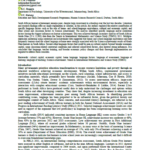The impact of language factors on learner achievement in Science

South African learner achievement remains poor, despite large investment in schooling over the last two decades. Literature and research findings offer no single explanation or solution. In this article, the authors explored the relative contribution of specific language factors such as the role of home- and school-language equivalence, cultural and economic capital, and other school and classroom factors to Science achievement. The analysis identified specific language and/or contextual factors having the biggest influence on learner achievement. This was achieved through secondary analysis of South African Grade Nine (N = 12,000) data from the Trends in International Mathematics and Science Study (TIMSS) 2011. Multipleregression modelling using contextual and achievement data suggested that home- and school-language equivalence and how frequently learners used the school language at home were strongly associated with the Science achievement results of Grade Nine learners in South Africa. Several other language factors that could be seen as cultural capital, beyond broader economic capital, some classroom-related contextual conditions and selected school-level factors, also showed strong influences. It is concluded that language, teacher training, and broader economic policy changes and their thorough implementation are required to address these concerns.
